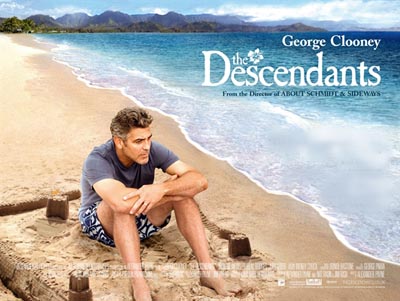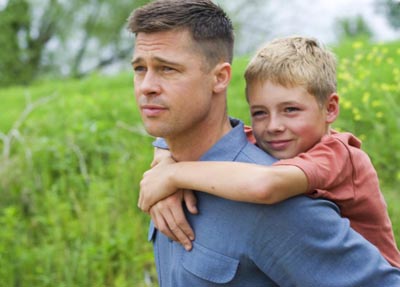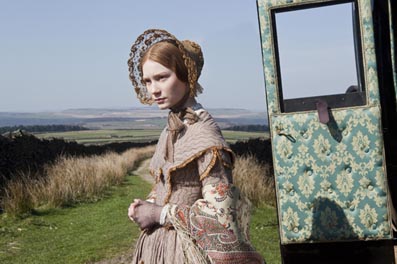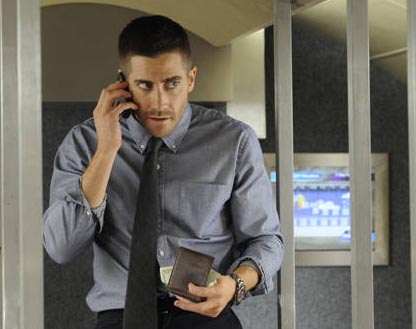
by Christina Waters | Jan 2, 2012 | Home, Movies |
A feast for the mind as well as the eye, the shabby paranoia of Cold War espionage makes a bracing cinematic cocktail, neither shaken nor stirred. A dirty patina of brown and grey adheres to every  engrossing scene of this version of John LeCarre’s spy saga Tinker Tailor Soldier Spy. Relinquish any fears that the indelible performance by Alec Guinness as spy master George Smiley in the archetypal 1973 BBC series might upstage this film version. The confidence of director Tomas Alfredson and his astonishing cinematographer Hoyte van Hoytema will dispel all doubts
engrossing scene of this version of John LeCarre’s spy saga Tinker Tailor Soldier Spy. Relinquish any fears that the indelible performance by Alec Guinness as spy master George Smiley in the archetypal 1973 BBC series might upstage this film version. The confidence of director Tomas Alfredson and his astonishing cinematographer Hoyte van Hoytema will dispel all doubts
Even for those who have read the book and gorged upon the multi-part television series, Le Carré’s tale is dense and labyrinthean as only a cold war spy tale can be. This is, after all, a tightly buttoned world in which there are no good guys. The ugly underbelly of bureaucratic betrayal makes a bracing cautionary bulwark for those still under the illusion that espionage is glamorous. There are no Sean Connerys here.
We meet the career MI6 agents—a sorry lot of paranoid professionals who have sold their individual dreams to a collective nightmare—just as a secret deal to bring in a high-ranking Soviet defector has gone horribly wrong. (more…)

by Christina Waters | Dec 5, 2011 | Home, Movies |
I thought I was going to see George Clooney win an Oscar. I didn’t.  He won’t. But The Descendants stayed with me and continued to spin out and unfurl deep-tissue feelings and puzzles and bits of beauty long after I left The Nick last weekend and headed out into the blustery twilight.
He won’t. But The Descendants stayed with me and continued to spin out and unfurl deep-tissue feelings and puzzles and bits of beauty long after I left The Nick last weekend and headed out into the blustery twilight.
The camera loves Clooney almost as much as it loved Marilyn Monroe. There simply are no bad angles on this beautiful man. And while it’s clear he can hold the center of a film, he does so by sleight of hand. He is a quiet vortex around which all of the action, the drama, the storming and revelation takes place. Somehow his winning features—the thoughtful brow, the sensitive facial muscles, the glowing eyes, the gorgeous legs—get close to the point, but never quite land on it.
He doesn’t convince me, even though his character—an Hawaiian heir to a huge land trust, with two out-of-control young daughters and a dying wife—did.

by Christina Waters | Jun 30, 2011 | Home, Movies |
 After a long gestation, Terence Malick’s fifth film, Tree of Life, has entered our cinematic bloodstream. It is a lengthy elegy on nothing less than desire, loss, faith, love and the cosmos. What else could we expect of a man who once translated Heidegger and taught philosophy at MIT?
After a long gestation, Terence Malick’s fifth film, Tree of Life, has entered our cinematic bloodstream. It is a lengthy elegy on nothing less than desire, loss, faith, love and the cosmos. What else could we expect of a man who once translated Heidegger and taught philosophy at MIT?
In Tree of Life, Malick the existential ruminator meets Malick the filmmaker’s filmmaker, and the result is a controversial, overly-long, unforgettable work that took this year’s Palme d’Or at Cannes.
Whatever it isn’t (more on that later), Tree is a deeply moving portrait of an American family, set in Texas of the 1950s. However much Malick attempts to lay on baroque opulence in the form of digressions into cosmic imagery, digressions that literally unfurl the creation of the universe, digressions in the form of achingly beautiful classical music — the soul of the film is the complex and stormy relationship between a father (Brad Pitt) and his sons (the eldest, Jack, played by an astonishing young Hunter McCracken).
Pitt is a revelation as the ambitious father whose dashed dreams (more…)

by Christina Waters | Apr 21, 2011 | Movies |
 Dark, mercurial, intelligent and yes, dear reader, romantic—the most recent screen version of Charlotte Brontë’s Jane Eyre is utterly captivating. With its Pre- Raphaelite doorways, its Caspar David Friedrich fog-drenched forests, and its gothic vistas of sight (cinematography by Adriano Goldman) and sound (music by Dario Marianelli), this film will satisfy the pickiest audience on the planet—Brontë groupies who adore this tale of a “small, plain” young woman whose fierce spirit secures her place in literary Valhalla.
Dark, mercurial, intelligent and yes, dear reader, romantic—the most recent screen version of Charlotte Brontë’s Jane Eyre is utterly captivating. With its Pre- Raphaelite doorways, its Caspar David Friedrich fog-drenched forests, and its gothic vistas of sight (cinematography by Adriano Goldman) and sound (music by Dario Marianelli), this film will satisfy the pickiest audience on the planet—Brontë groupies who adore this tale of a “small, plain” young woman whose fierce spirit secures her place in literary Valhalla.
Director Cary Fukunaga (a UCSC alum) has deepened the sense of mystery surrounding the manor house of the restless (more…)

by Christina Waters | Apr 15, 2011 | Movies |
 Think Inception, Groundhog Day and a touch of The Matrix, and you’ll begin to see why this crisp bit of cinematic distraction is more than simply entertaining.
Think Inception, Groundhog Day and a touch of The Matrix, and you’ll begin to see why this crisp bit of cinematic distraction is more than simply entertaining.
Source Code, directed by Duncan Jones, stars a resilient and compelling Jake Gyllenhaal as Sgt. Colter Stevens, a fighter pilot assigned to Afghanistan who suddenly “awakes” in another man’s body. Another man’s body on a commuter train about to be blown sky high.
Gyllenhaal has landed back on his feet with this part, and with his sweetly feral face set to register every nuance of his character’s situation, he completely owns this film from heart-pounding start to almost satisfying ending.
Turns out, Gyllenhaal’s character is a man suspended between worlds, literally, (more…)
by Christina Waters | Mar 6, 2011 | Movies |
Best Actress – Annette Bening (okay, even sacrificing a chicken couldn’t stop Natalie Portman from taking the Oscar for Best Performance by eyebrows and collarbones)
Best Actor – Colin Firth (duh) (he was great in the film, but his acceptance speech will go down in history as one of the dullest, most awkward moments in public speaking)
Best Supporting Actress – Melissa Leo (Her’s was the quintessential “why did we give the Oscar to her?” moment. A real moment of low-brow emoting. An utterly phony display of fake emotions, matched perfectly by her gown of flea market crocheted doilies.)
Best Supporting Actor – Christian Bale (Proof that Welshmen are in a class by themselves, and easily the best-looking guy on the stage that night.)
Best Director -Darren Aronofsky (or maybe the Coens)Â (I blew this one)
Best Film – The Kings Speech (Safe and predictable, just like the Oscar “awards” themselves.)

 engrossing scene of this version of John LeCarre’s spy saga Tinker Tailor Soldier Spy. Relinquish any fears that the indelible performance by Alec Guinness as spy master George Smiley in the archetypal 1973 BBC series might upstage this film version. The confidence of director Tomas Alfredson and his astonishing cinematographer Hoyte van Hoytema will dispel all doubts
engrossing scene of this version of John LeCarre’s spy saga Tinker Tailor Soldier Spy. Relinquish any fears that the indelible performance by Alec Guinness as spy master George Smiley in the archetypal 1973 BBC series might upstage this film version. The confidence of director Tomas Alfredson and his astonishing cinematographer Hoyte van Hoytema will dispel all doubts




